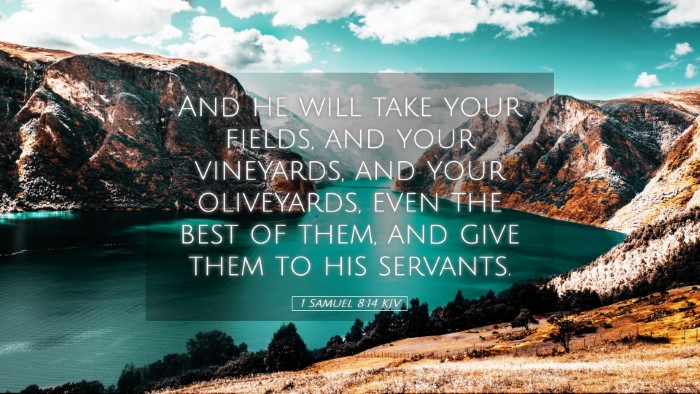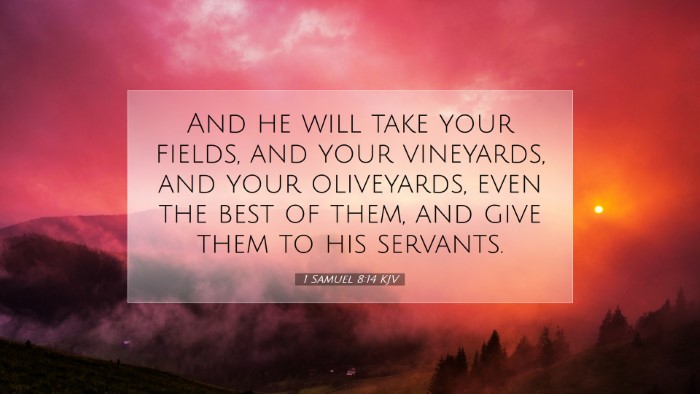Commentary on 1 Samuel 8:14
Verse: "And he will take your fields, and your vineyards, and your oliveyards, even the best of them, and give them to his servants." (1 Samuel 8:14)
Introduction
The passage of 1 Samuel 8:14 occurs in a pivotal moment in the history of Israel. The people demand a king to govern them like other nations, forsaking their unique identity as a kingdom under God’s direct rule. This request not only reveals their discontent with the prophetic leadership of Samuel but also foreshadows the consequences of their choice. The commentary here seeks to explore the implications of this verse through insights gained from public domain theologians including Matthew Henry, Albert Barnes, and Adam Clarke.
General Context
The broader context of 1 Samuel 8 establishes a critical juncture in Israel's governance. The Israelite elders' demand highlights a transition from theocratic rule towards monarchy. Samuel, the prophet and judge, perceives this as a rejection of divine governance, which opens profound theological implications regarding human leadership.
The Divine Warning
In 1 Samuel 8:11-18, God relays to Samuel the conditions of monarchy, outlining the burdens a king would impose. Specifically, verse 14 encapsulates one of the most explicit warnings — the king’s prerogative to seize fields and vineyards:
-
Matthew Henry:
Henry emphasizes the inevitability of human rulers exercising authority in ways that may infringe upon the liberties of the people. Here, the term "fields" symbolizes material possessions and livelihood, further accentuating the weight of royal taxation and conscription.
-
Albert Barnes:
Barnes notes that the demand for a king resulted in an expectation of benefits and security. However, here the prophet Samuel is clarifying that kings may not only fail to deliver those promises but often exploit the very subjects they are meant to protect.
-
Adam Clarke:
Clarke stresses that the "best of them" — referring to the select fields and vineyards — indicates a profound irony, as the people’s desire for national pride through a monarchy would lead them towards loss of personal property and agency.
Analysis of the Implications
As we reflect on 1 Samuel 8:14, we are invited to consider the implications of authority and governance within both the ancient and contemporary contexts:
-
Loss of Liberty:
The congregation's desire for a king points to a fundamental motif found throughout scripture: human governance often comes at the cost of individual freedoms. The insatiable quest for security through earthly means can lead to bondage rather than liberation.
-
Human Leadership and Governance:
Samuel's admonishments reveal the nature of human authority — it can manipulate and impose burdens contrary to a lifestyle of covenantal faithfulness. The passage prompts the church today to reflect critically on its leadership structures and the balance of authority and accountability.
-
The Nature of God as King:
Throughout scripture, God’s kingship is presented as one of justice, mercy, and care for all creations. As the Israelites sought to trade divine kingship for human governance, they overlooked the generous provision and grace that comes from trusting in God.
Contemporary Reflections
The lessons drawn from 1 Samuel 8:14 remain relevant today as societies grapple with leadership and governance choices:
-
Discerning True Leadership:
Modern leaders, be they political or ecclesiastical, should be gauged not solely by their promises but by their methods and the impact of their governance on the welfare of the community.
-
Community Responsibility:
When leaders act in a way that can lead to the exploitation of the community, it is the shared responsibility of the congregation or society to voice concerns and hold elected leaders accountable to their calling.
-
The Importance of Prayer and Guidance:
Like Samuel sought God’s guidance, today’s leaders and congregations must commit to dialoguing with God in prayer, seeking divine input on how to live in righteousness and integrity under human governance.
Conclusion
In conclusion, 1 Samuel 8:14 serves as a sobering reminder of the costs associated with human leadership detached from divine wisdom. Through the combined insights of Matthew Henry, Albert Barnes, and Adam Clarke, we discover that the quest for empirical security, when placed above faith in God, can lead to unforeseen consequences of oppression and loss of personal stewardship. It challenges contemporary believers to engage thoughtfully in matters of governance, remaining vigilant to the presence of God's sovereignty amidst the complexities of human authority.


